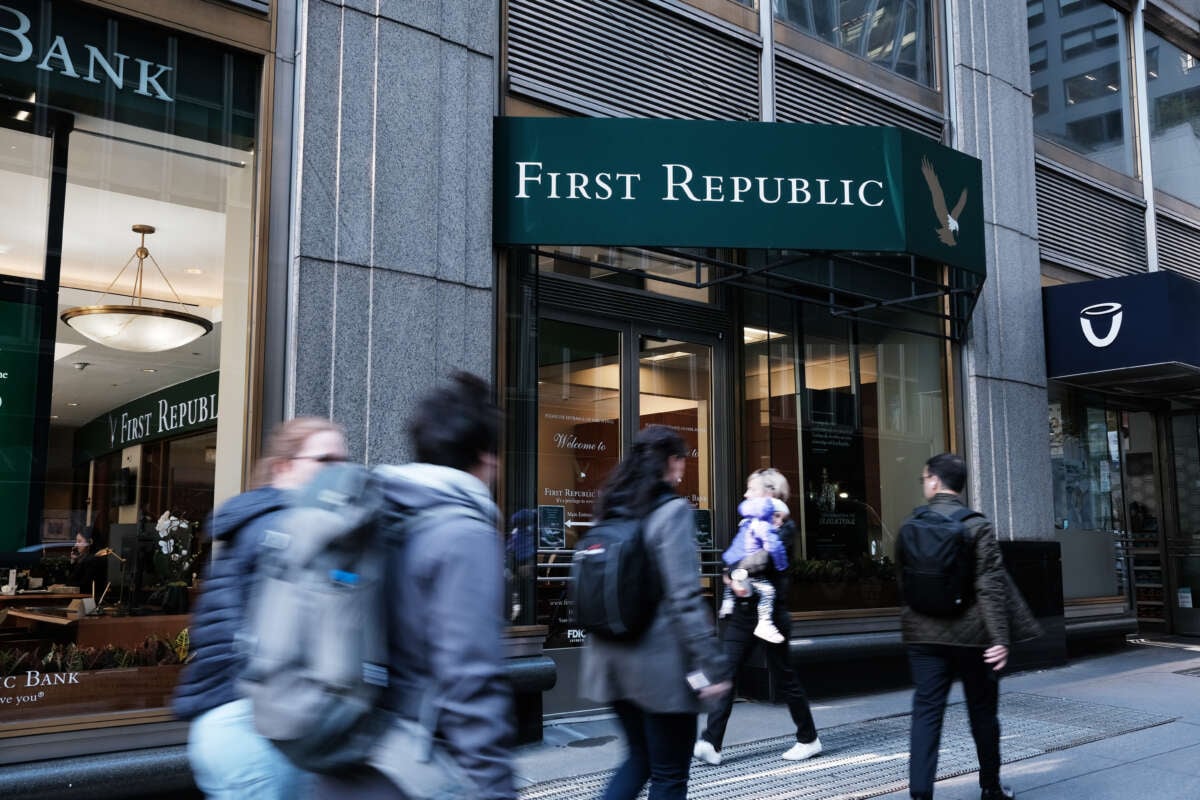Sen. Elizabeth Warren said Monday that the latest government bailout of a failing Wall Street institution shows how much the financial system remains rigged in favor of powerful banks and that it is beyond time for Congress to step up with increased oversight and reforms.
Federal regulators Monday announced they had seized the entirety of First Republic Bank and sold it to JPMorgan Chase for an undisclosed price — the latest fallout from a deregulated banking system in which the U.S. government has stepped in to backstop Wall Street.
“The failure of First Republic Bank shows how deregulation has made the too big to fail problem even worse,” said Warren in response to the news. “A poorly supervised bank was snapped up by an even bigger bank — ultimately taxpayers will be on the hook. Congress needs to make major reforms to fix a broken banking system.”
Last week, as Common Dreams reported, the Federal Reserve issued the results of an internal investigation which showed the collapse of Silicon Valley Bank earlier this year was at least partly due to the 2018 deregulation of mid-sized banks that was approved by Congress and signed into law by former President Donald Trump.
In an early morning statement, the Federal Deposit Insurance Corporation (FDIC) said First Republic — which has been teetering on collapse for weeks — was first closed before being sold to banking giant JPMorgan following a bidding process for the smaller bank’s assets.
“As part of the transaction,” said the FDIC, “First Republic Bank’s 84 offices in eight states will reopen as branches of JPMorgan Chase Bank, National Association, today during normal business hours. All depositors of First Republic Bank will become depositors of JPMorgan Chase Bank, National Association, and will have full access to all of their deposits.”
According to the Washington Post:
The acquisition makes JPMorgan, already the nation’s largest bank, even bigger and could draw political scrutiny from progressive Democrats in Washington.
First Republic failed despite having received a $30 billion lifeline from 11 of the country’s largest banks in March. JPMorgan said the $30 billion would be repaid after the deal closes. Overall, First Republic will go down in history as the second largest U.S. bank by assets to collapse after Washington Mutual, which failed during the financial crisis of 2008.
FDIC said the cost of the deal to the Deposit Insurance Fund which it manages will be approximately $13 billion.
“In other words, good banks and their customers pay to insure bad banks,” said Richard Painter, law professor and former White House ethics chief. “How much did First Republic’s execs who created this mess have to pay? If we made them pay, First Republic might not have failed.”
In a statement on Friday in anticipation of First Republic’s collapse, Lisa Gilbert, executive vice president of Public Citizen, said, “Once again, we’re reaping the bitter harvest of financial deregulation.”
Gilbert’s colleague, financial policy expert Bart Naylor, said, “Bankers at First Republic make reckless decisions, encouraged by bad pay-related incentives.”
“Lawmakers understood this was a problem throughout the industry following the 2008 financial crash and required a rule to stop it,” Naylor added. “But dangerously, that rule has not yet been implemented. With the failure of First Republic following the failure of Silicon Valley Bank, regulators must reform banker pay immediately.”
Our most important fundraising appeal of the year
December is the most critical time of year for Truthout, because our nonprofit news is funded almost entirely by individual donations from readers like you. So before you navigate away, we ask that you take just a second to support Truthout with a tax-deductible donation.
This year is a little different. We are up against a far-reaching, wide-scale attack on press freedom coming from the Trump administration. 2025 was a year of frightening censorship, news industry corporate consolidation, and worsening financial conditions for progressive nonprofits across the board.
We can only resist Trump’s agenda by cultivating a strong base of support. The right-wing mediasphere is funded comfortably by billionaire owners and venture capitalist philanthropists. At Truthout, we have you.
We’ve set an ambitious target for our year-end campaign — a goal of $230,000 to keep up our fight against authoritarianism in 2026. Please take a meaningful action in this fight: make a one-time or monthly donation to Truthout before December 31. If you have the means, please dig deep.
